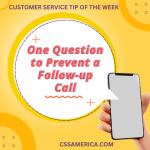 “Customer Service” can be an uncomfortable phrase to use in the education world. We’ve seen this lack of comfort at the K12, community college, and university levels. There is often a discomfort with viewing students as customers.
“Customer Service” can be an uncomfortable phrase to use in the education world. We’ve seen this lack of comfort at the K12, community college, and university levels. There is often a discomfort with viewing students as customers.
But the idea of serving others is clearly important to those in education – it’s amazing how much care that education industry professionals can show for that student – whether they’re the kindergartener or the near-term college graduate. So where there’s care, there’s a heart part to what people do in education.
To learn to best deliver what we’ll call “Service Excellence” to students, parents, and others inside and outside of the school district, the Cleveland Metropolitan School District is partnering with the Cleveland Clinic on training that taps into their HEART customer service training program. According to the article Cleveland school district getting heart-to-heart talks from Cleveland Clinic, the District is “no longer a monopoly in the market where people go to school because we said so.”
Competition has spurred this focus on Service Excellence, and the training is just a piece of what the District’s doing. They’re also “labeling” (in a good way) staff’s roles beyond their functional responsibilities to also address their role in the service experience. A local community college is better measuring satisfaction, and they’re sharing results with the community to raise transparency about performance.
When you think about competition, growth, and success in the eyes of a community – don’t be daunted by the challenges, and don’t try to manufacture growth or focus on the competition. To get there, you have to start here – inside the organization.
Equip staff with the tools, motivation, training, and expectations to deliver Service Excellence. Take Customer Service to HEART.
Did you like this post? Here are other Education-related posts:























